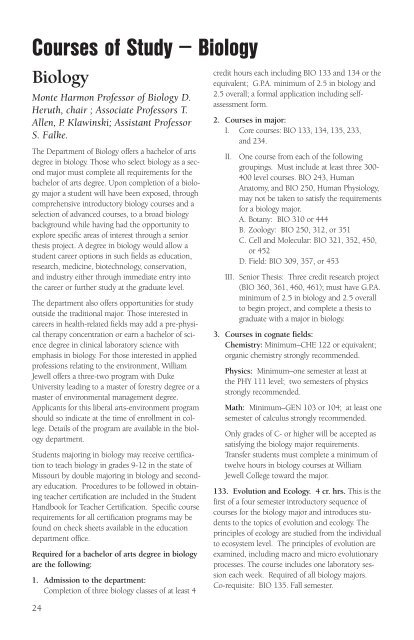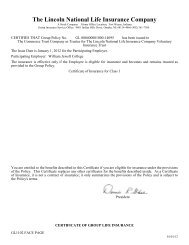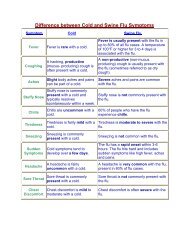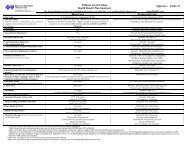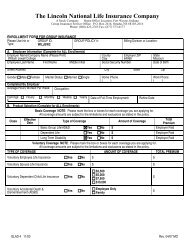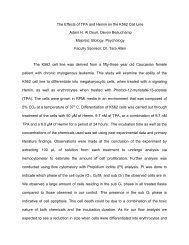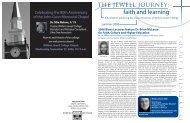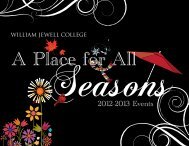Courses of Study - William Jewell College
Courses of Study - William Jewell College
Courses of Study - William Jewell College
Create successful ePaper yourself
Turn your PDF publications into a flip-book with our unique Google optimized e-Paper software.
<strong>Courses</strong> <strong>of</strong> <strong>Study</strong> – Biology<br />
Biology<br />
Monte Harmon Pr<strong>of</strong>essor <strong>of</strong> Biology D.<br />
Heruth, chair ; Associate Pr<strong>of</strong>essors T.<br />
Allen, P. Klawinski; Assistant Pr<strong>of</strong>essor<br />
S. Falke.<br />
The Department <strong>of</strong> Biology <strong>of</strong>fers a bachelor <strong>of</strong> arts<br />
degree in biology. Those who select biology as a second<br />
major must complete all requirements for the<br />
bachelor <strong>of</strong> arts degree. Upon completion <strong>of</strong> a biology<br />
major a student will have been exposed, through<br />
comprehensive introductory biology courses and a<br />
selection <strong>of</strong> advanced courses, to a broad biology<br />
background while having had the opportunity to<br />
explore specific areas <strong>of</strong> interest through a senior<br />
thesis project. A degree in biology would allow a<br />
student career options in such fields as education,<br />
research, medicine, biotechnology, conservation,<br />
and industry either through immediate entry into<br />
the career or further study at the graduate level.<br />
The department also <strong>of</strong>fers opportunities for study<br />
outside the traditional major. Those interested in<br />
careers in health-related fields may add a pre-physical<br />
therapy concentration or earn a bachelor <strong>of</strong> science<br />
degree in clinical laboratory science with<br />
emphasis in biology. For those interested in applied<br />
pr<strong>of</strong>essions relating to the environment, <strong>William</strong><br />
<strong>Jewell</strong> <strong>of</strong>fers a three-two program with Duke<br />
University leading to a master <strong>of</strong> forestry degree or a<br />
master <strong>of</strong> environmental management degree.<br />
Applicants for this liberal arts-environment program<br />
should so indicate at the time <strong>of</strong> enrollment in college.<br />
Details <strong>of</strong> the program are available in the biology<br />
department.<br />
Students majoring in biology may receive certification<br />
to teach biology in grades 9-12 in the state <strong>of</strong><br />
Missouri by double majoring in biology and secondary<br />
education. Procedures to be followed in obtaining<br />
teacher certification are included in the Student<br />
Handbook for Teacher Certification. Specific course<br />
requirements for all certification programs may be<br />
found on check sheets available in the education<br />
department <strong>of</strong>fice.<br />
Required for a bachelor <strong>of</strong> arts degree in biology<br />
are the following:<br />
1. Admission to the department:<br />
Completion <strong>of</strong> three biology classes <strong>of</strong> at least 4<br />
24<br />
credit hours each including BIO 133 and 134 or the<br />
equivalent; G.P.A. minimum <strong>of</strong> 2.5 in biology and<br />
2.5 overall; a formal application including selfassessment<br />
form.<br />
2. <strong>Courses</strong> in major:<br />
I. Core courses: BIO 133, 134, 135, 233,<br />
and 234.<br />
II. One course from each <strong>of</strong> the following<br />
groupings. Must include at least three 300-<br />
400 level courses. BIO 243, Human<br />
Anatomy, and BIO 250, Human Physiology,<br />
may not be taken to satisfy the requirements<br />
for a biology major.<br />
A. Botany: BIO 310 or 444<br />
B. Zoology: BIO 250, 312, or 351<br />
C. Cell and Molecular: BIO 321, 352, 450,<br />
or 452<br />
D. Field: BIO 309, 357, or 453<br />
III. Senior Thesis: Three credit research project<br />
(BIO 360, 361, 460, 461); must have G.P.A.<br />
minimum <strong>of</strong> 2.5 in biology and 2.5 overall<br />
to begin project, and complete a thesis to<br />
graduate with a major in biology.<br />
3. <strong>Courses</strong> in cognate fields:<br />
Chemistry: Minimum–CHE 122 or equivalent;<br />
organic chemistry strongly recommended.<br />
Physics: Minimum–one semester at least at<br />
the PHY 111 level; two semesters <strong>of</strong> physics<br />
strongly recommended.<br />
Math: Minimum–GEN 103 or 104; at least one<br />
semester <strong>of</strong> calculus strongly recommended.<br />
Only grades <strong>of</strong> C- or higher will be accepted as<br />
satisfying the biology major requirements.<br />
Transfer students must complete a minimum <strong>of</strong><br />
twelve hours in biology courses at <strong>William</strong><br />
<strong>Jewell</strong> <strong>College</strong> toward the major.<br />
133. Evolution and Ecology. 4 cr. hrs. This is the<br />
first <strong>of</strong> a four semester introductory sequence <strong>of</strong><br />
courses for the biology major and introduces students<br />
to the topics <strong>of</strong> evolution and ecology. The<br />
principles <strong>of</strong> ecology are studied from the individual<br />
to ecosystem level. The principles <strong>of</strong> evolution are<br />
examined, including macro and micro evolutionary<br />
processes. The course includes one laboratory session<br />
each week. Required <strong>of</strong> all biology majors.<br />
Co-requisite: BIO 135. Fall semester.


